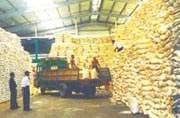|
Fertilizer firms go bust over ad hoc state policies By Quintus
Perera
Two fertilizer distribution companies - Anglo-Fertilizer (Pvt) Ltd and Falcon (Pvt) Ltd - have crashed due to the government's failure to pay back the subsidies granted to the farmers in the sale of urea fertilizer, a media briefing was told last week. The private
sector fertilizer importers of Sri Lanka met the media to apprise
the public of a grave crisis in the fertilizer industry indicating
that the government owed them a massive sum of Rs. 1.2 billion in
subsidy payments accumulated since last June. Lakshman Niyangoda,
Director, A. Baur and Co Ltd said that the government's dues to
the four fertilizer importing and distributing companies were as
follows - CIC - Rs. 511 million Baurs -Rs. 220 mln, McLarens International
-Rs. 154 mln and ETA Lanka -Rs. 264 mln and the total interest accrued
on these monies had risen to Rs. 200 million. He said that
due to the government dishonouring its pledge to pay the dues within
21 days, these companies could run into serious liquidity problems
and already two such companies had to put up shutters due to this
delay. He said that earlier the government was adjusting the subsidy
according to price fluctuations of urea in the world market. But
since October last year the subsidy has been static whatever the
price fluctuations of urea in the world market. Fertilizer
industry officials noted that if these dues were not paid before
the next Yala season that would begin in April just after the Sinhala
and Tamil New Year, these companies would not be able to import
any more fertilizer as there could arise a serious liquidity problem.
On the other hand banks were pressing these companies to repay the
dues urgently. If this happened there would be serious repercussions
amounting to massive paddy crop failure. Sarath Silva, Jt. Managing Director, McLarens International said that last October a metric tonne of urea fertilizer cost $ 145 and they still charge the same price though the price has now shot up to $ 200. He said that they have not increased the prices, but there was speculation that if war broke out in Iraq the price structure for urea would change adversely as around 80 percent as this fertilizer is imported from the Middle Eastern countries while the balance came from Indonesia and Russia. When asked whether they would contemplate bulk storage to prepare for the impending war, Silva said that it would be very unlikely as urea was a product where the price has been fluctuating in an upward trend
|
||||
Copyright © 2001 Wijeya Newspapers
Ltd. All rights reserved. |
